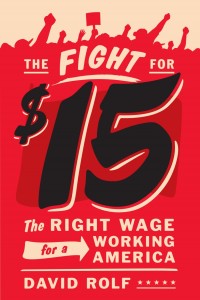“The Fight for Fifteen”
Only a year after the first fast food worker in Seattle walked off the job on strike, the city’s $15 minimum wage was signed into law. This movement for a living wage and the right to form a union is now impossible for lawmakers, businesses, and the media to ignore.
In “The Fight for Fifteen: The Right Wage for a Working America” (The New Press, 2016), David Rolf, one of the leaders behind SeaTac, WA and Seattle’s $15 minimum wage laws, writes about the people and the strategy that won the highest minimum wage in U.S. history. He relies on history, economics, and political wisdom to layout a blueprint for a $15 national minimum wage and an economy that works for working people.
From “The Fight for Fifteen: The Right Wage for a Working America”:
Throughout a century of public debate, business lobbyists, trade associations, and the economic right have portrayed minimum wages as harmful to business. The criticisms raised by minimum-wage opponents display a remarkable consistency over the past hundred years, despite huge changes in our economy. Data and experience, in other words, have been irrelevant to those who oppose higher minimum wages. This is not because minimum wages actually cause widespread harm to business—the evidence is quite the opposite. It has nothing to do with the greater good of the American economy or the average American worker. It is because some conservative politicians, low-wage industry lobbyists, and large business associations (such as the National Restaurant Association and the U.S. Chamber of Commerce) habitually reject any “interference” in their pursuit of corporate profits. But it’s not just the big-business–right-wing nexus that has created a political environment in which wage hikes are seen as potentially toxic moves. Over the past four decades, liberals also have largely accepted the trickle-down explanation of what growth is (higher profits, rather than more jobs and higher wages) and where growth comes from (lower taxes and less regulation on businesses and the wealthy). Since the late 1970s, even most liberal Democratic proposals have done little more than tinker around the edges of century-old minimum-wage laws, increasing the wage by a quarter here and fifty cents there, allowing its value to erode precipitously over the past decades, afraid to claim the moral and economic center.
And so through Republican and Democratic administrations alike, corporate America has fought for and won less regulation, lower taxes and higher profits, while middle-class America has gotten the shaft— policies that helped lead to the economic disaster of the Great Recession and the slow recovery that followed. For a generation, America’s political class has lacked the vision or courage to articulate or defend the true interests of American workers and the middle class.
Praise for “The Fight For Fifteen”:
“With intellectual rigor and practical wisdom, David Rolf shows why the fight for a $15 an hour minimum wage is not just a local battle but a national moral necessity — and a cornerstone of a decent society.”
—Robert B. Reich, Chancellor’s Professor of Public Policy, University of California at Berkeley
“Anyone interested in fighting for workers and getting results should read David Rolf’s new book on the importance of raising the minimum wage. Few people in this country have the on-the-ground perspective and passion that David has when it comes to increasing wages and giving workers and families the tools they need to succeed.”
—Senator Patty Murray, D-WA
“An expert exploration of a provocative blueprint for rescuing the American middle class through the creation of a new living wage. A savvy inside look at the social movement challenging decades of stark economic decline.”
—Kirkus Reviews
“David Rolf shows that raising the minimum wage to $15 is both just and necessary, lest the American dream of middle class prosperity turn into a nightmare of enduring poverty for millions of workers in the bottom half of wage earners.”
—David Cay Johnston, bestselling author of “The Fine Print” and “Free Lunch,” and winner of the Pulitzer Prize
“David Rolf has helped put low-wage workers in Seattle at the forefront of a national movement for a $15 minimum wage; his forward thinking helped paved the way for some of the greatest progress toward addressing our nation’s growing income inequality that we’ve seen in decades.”
—Saru Jayaraman, author of “Behind The Kitchen Door,” co-founder, Restaurant Opportunities Centers United
“David Rolf has become the most successful advocate for raising wages in the 21st century. Where others talk, David leads, and his book is an inside look at a campaign that has the potential to make work pay again.”
—Andy Stern, senior fellow, at Columbia University’s Richard Paul Richman Center for Business, Law, and Public Policy; former president of the 2.2 million member SEIU
“David Rolf’s first book is a call to action, reminding us that we define what’s possible in politics, and that the future of the economy is at stake. If you’re interested in what can actually be done about inequality, read this book.”
—Ai-jen Poo, Director, National Domestic Workers Alliance and author of “The Age of Dignity: Preparing for the Elder Boom in an Aging America”
Resources
There are hundreds, if not thousands, of community groups, citizen organizations, organizing campaigns, and unions fighting for better wages and a better life for workers.
Here are a few of the organizations discussed in “The Fight for Fifteen”:
Fight for $15
Fast Food Forward
SEIU
SEIU 775
Working Washington
15 Now
AFL-CIO
Alliance for a Just Society
Berkeley Center for Labor Research and Education
Center for American Progress
Center for Community Change
Center for Economic and Policy Research
Center for Popular Democracy
Center on Budget and Policy Priorities
Coalition of Immokalee Workers
Coworker.org
Democratic National Committee
Demos
Domestic Workers United
Economic Policy Institute
Fair Work Center
Freelancers Union
Jobs with Justice
Los Angeles Alliance for a New Economy
National Day Laborer Organizing Network
National Domestic Workers Alliance
National Employment Law Project
National Guestworker Alliance
National People’s Action
New York Communities for Change
New York Taxi Workers Alliance
OneAmerica
OUR Walmart
Partnership for Working Families
Puget Sound Sage
Restaurant Opportunities Center
Roosevelt Institute
Socialist Alternative
Teamsters
UNITE HERE
United Food and Commercial Workers Union
Washington Center for Equitable Growth
The Workers Lab
Workers Defense Project
Working Families Party
Disclaimer: The list above is representative, not inclusive. Linking here does not imply an organizational endorsement of the book “The Fight for Fifteen” or any of the author’s specific conclusions or policy proposals.

